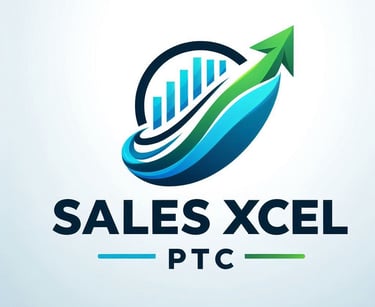Sales Goal Driver vs. Sales Process Facilitator?
How experience, an understanding of team personalities and EQ combine to form the complete package in Sales Leadership
10/2/20256 min read


Leadership styles significantly influence team performance, morale, and long-term success. Two distinct approaches often stand out: the Sales Goal Driver and the Sales Process Facilitator. The Sales Goal Driver focuses on achieving targets through meticulous tracking and accountability, while the Sales Process Facilitator emphasizes empowering their team through process, collaboration, and positivity. Both aim to drive revenue, but their methods and impact differ markedly. Furthermore, sales management or industry experience—combined with emotional intelligence and an awareness of team personality dynamics—can combine to form a true Sales Leader.
This article explores the characteristics, strengths, and challenges of each leadership style and highlights how experience, EQ, and personality awareness amplify the Sales Leader's impact.
The Sales Goal Driver: Precision and Performance Tracking
A Sales Goal Driver is defined by their focus on metrics and outcomes. Their leadership revolves around ensuring the team meets specific targets—revenue goals, deal closures, or pipeline growth—through rigorous tracking and accountability.
Key Characteristics
Meticulous Goal Tracking: They closely monitor key performance indicators (KPIs) such as quota attainment, conversion rates, and pipeline velocity, often using CRM tools for real-time insights.
Frequent Pipeline Updates: They require regular, sometimes daily, updates on deal statuses to ensure alignment with team objectives.
Quota-Driven Communication: Conversations often center on progress toward targets, with phrases like “We’re at 80% of our goal” or “We need $X to close this quarter” dominating discussions.
Accountability and Deadlines: They set clear expectations and hold team members accountable, using performance reviews or corrective actions to address shortfalls.
Strengths
Clarity of Purpose: They provide unambiguous targets, ensuring the team knows exactly what’s expected.
Data-Driven Decisions: Their focus on metrics allows for early identification of trends or issues, enabling strategic adjustments.
Results-Oriented Culture: Their emphasis on outcomes fosters a competitive environment that motivates high performers.
Potential Pitfalls
High-Pressure Environment: A relentless focus on numbers can lead to stress, burnout, or disengagement.
Neglect of Process: Prioritizing results over process may overlook critical steps like relationship-building or objection handling.
Micromanagement Risk: Frequent check-ins can feel overbearing, stifling creativity and autonomy.
The Sales Process Facilitator: Empowering Process and Positivity
The Sales Process Facilitator takes a people-centric approach, focusing on empowering their team by refining the sales process, fostering collaboration, and maintaining a positive mindset. They prioritize the journey to success, helping reps navigate challenges and grow.
Key Characteristics
Focus on Next Steps: They emphasize critical actions to advance deals, such as crafting compelling pitches, addressing customer concerns, or preparing for negotiations.
Collaborative Problem-Solving: They work alongside their team to analyze strategies, encouraging open dialogue to tackle roadblocks.
Overcoming Frustration: Recognizing the emotional challenges of sales, they provide support to help reps stay resilient and motivated.
Leading by Example: They model positivity, energy, and a drive to win, inspiring their team to adopt the same mindset.
Strengths
Team Empowerment: By focusing on process and development, they build confidence and long-term capability.
Resilient Culture: Their supportive approach creates a positive environment, reducing burnout and fostering loyalty.
Process Improvement: By refining how deals are progressed, they drive sustainable success.
Potential Pitfalls
Metrics Neglect: Without a strong focus on KPIs, the team may lose sight of quotas or organizational goals.
Over-Flexibility: A highly collaborative approach can lead to inconsistency if clear expectations aren’t set.
Time-Intensive: Coaching and mentoring require significant effort, which can be challenging in high-pressure environments.
Sales Management and Industry Experience, combined with strong Emotional Intelligence and Understanding of Team Personalities
Experience alone does not define success with either approach; the most impactful leaders also draw on emotional intelligence (EQ) and understand the personality makeup of their team.
1. Deep Understanding of the Sales Process
Sales management experience provides a comprehensive grasp of the sales cycle, from prospecting to closing. An experienced Sales Process Facilitator can identify where reps struggle—whether in lead qualification, objection handling, or negotiations—and offer targeted, practical guidance. For example, they might coach a rep on improving discovery calls by sharing techniques from their own career, such as asking open-ended questions to uncover customer needs.
Industry experience adds context-specific expertise. A Sales Process Facilitator familiar with industries like SaaS or pharmaceuticals understands unique challenges, such as complex buying committees or regulatory hurdles. They can tailor coaching to address these nuances, making their advice more actionable and relevant.
Combined with EQ, they can coach not just on technical execution but also on handling client and team emotions—such as hesitation, skepticism, or urgency.
2. Credibility and Trust
Experience builds credibility, but EQ builds trust. Reps are more likely to trust guidance from someone who has successfully navigated similar challenges. A Sales Process Facilitator who has closed high-stakes deals or managed tough sales cycles can share relatable stories, fostering trust and encouraging reps to embrace their coaching. For instance, an enabler with B2B sales experience can empathize with the frustration of long sales cycles and offer proven strategies, such as building trust with multiple stakeholders.
This credibility strengthens team relationships, making reps more open to feedback and collaboration, which is central to the enabler’s approach.
A leader who demonstrates empathy, listens actively, and adapts to individual personalities earns the right to influence. When team members feel understood both professionally and personally, they are more receptive to feedback and willing to stretch their performance.
3. Strategic Prioritization
With sales management experience, a Sales Process Facilitator can prioritize high-impact activities, guiding reps to focus on tasks that drive results, like following up with a decision-maker versus refining a low-priority proposal. Their industry knowledge allows them to anticipate market trends or customer objections, enabling proactive coaching. For example, in a tech sales environment, an experienced enabler might foresee pricing objections and coach reps on value-based selling techniques, saving time and boosting close rates.
By layering in personality awareness—recognizing who thrives on detail, who excels at relationship-building, and who drives momentum—they can assign responsibilities strategically, ensuring a balanced and effective team dynamic.
4. Modeling Resilience and Positivity
Sales management often involves overcoming setbacks, such as missed quotas or lost accounts. An experienced Sales Process Facilitator can draw on these moments to model resilience, sharing how they turned challenges into opportunities. For instance, they might recount how they recovered a stalled deal by reframing the conversation around customer ROI, inspiring reps to stay positive and persistent.
Industry experience enhances this by providing context for handling sector-specific challenges. In a competitive industry like financial services, an experienced enabler can demonstrate how to differentiate offerings and maintain enthusiasm, setting a powerful example for the team.
EQ allows leaders to normalize setbacks while framing them as opportunities for growth. By sharing personal experiences of overcoming obstacles, and by maintaining optimism, enablers create a culture of resilience. This is especially powerful when different personality types in the team react differently to stress—some withdraw, others push harder. The leader’s awareness helps maintain balance.
5. Balancing Process and Results
One potential pitfall of the Sales Process Facilitator is neglecting metrics in favor of process. Sales management experience counters this by equipping them with a strong foundation in tracking KPIs and aligning efforts with organizational goals. They can integrate goal-oriented practices, like reviewing pipeline metrics, into their coaching without losing their focus on empowerment. This balance ensures the team stays on track while benefiting from a supportive, process-driven approach.
The strongest leaders integrate process discipline with metrics and overlay it with EQ. They recognize when a rep needs coaching versus when they need accountability, and they adapt based on personality styles. For example, an analytical rep may need detailed feedback, while a relational rep may benefit more from encouragement and role-playing scenarios.
Striking a Balance: Combining the Best of Both Worlds into a Sales Leader
The most effective sales leaders blend the strengths of the Sales Goal Driver and the Sales Process Facilitator while leveraging emotional intelligence and personality awareness to bring out the best in each team member. A balanced Sales Leader can:
Set Clear Goals with Process and EQ Support – Provide ambitious targets while coaching with sensitivity to individual learning styles and motivators.
Celebrate Milestones and Growth – Recognize progress in both metrics and personal development. Tailor recognition to personality types (some prefer public acknowledgment, others private).
Use Data and Emotional Insight Together – Numbers reveal performance gaps, but EQ helps address the why behind them.
Build Balanced Teams – Match technical experts with relational connectors, ensuring client needs are met from both logical and emotional angles.
Real-World Impact - Consider three teams:
Team A, led by a Sales Goal Driver, consistently hits quotas but faces high turnover due to a high-pressure, numbers-driven culture.
Team B, led by an inexperienced Sales Process Facilitator, fosters positivity but misses targets due to a lack of focus on metrics and poor prioritization.
Team C, led by a Sales Leader with deep sales management and industry experience combined with strong EQ and personality awareness. This Sales Leader sets clear goals but uses their expertise to coach reps through industry-specific challenges, like navigating complex RFPs. They model resilience by sharing past successes, inspire positivity, and use data to guide coaching without micromanaging. The result is a motivated, high-performing team with low turnover and consistent results.
Conclusion
The Sales Goal Driver and the Sales Process Facilitator represent two distinct approaches to sales leadership, each with unique strengths and challenges. The Sales Goal Driver drives results through structure and accountability, while the Sales Process Facilitator empowers teams through process, collaboration, and positivity. For the Sales Process Facilitator, sales management or industry experience is a powerful amplifier, providing the knowledge, credibility, and strategic insight to enhance coaching, build trust, and balance process with results. By blending the precision of goal-driven leadership with the empowerment of enabling, Sales Leaders can create high-performing, resilient teams that not only meet targets but thrive in today’s competitive sales landscape.
Expert advice for your business growth.
info@sales-xcel.com
© 2025. All rights reserved.


Sales Xcel PTC, LLC
